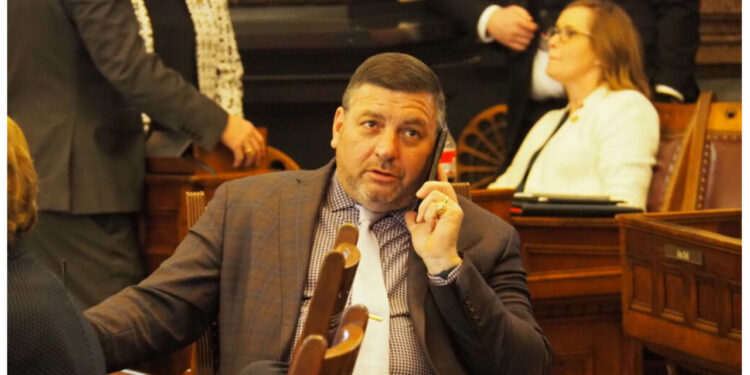The 10th Circuit U.S. Court of Appeals has dismissed an effort by Topeka Senator Richard Kloos to prevent the Internal Revenue Service from accessing the banking records of God’s Storehouse. Kloos, who is also a pastor at the coffee shop and thrift store, had sought to block the IRS from investigating the tax-exempt status and potential tax evasion of the nonprofit corporation. (Tim Carpenter/Kansas Reflector)
A federal appellate court has denied state Senator Richard Kloos’ request to dismiss an Internal Revenue Service summons for bank records related to a coffee shop and thrift store in Topeka. These records are being sought as part of an investigation into potential unpaid business taxes and the legal status of a not-for-profit corporation that the senator has claimed to be a church.
Kloos’ legal team has filed a request with the 10th Circuit of the U.S. Court of Appeals to block the IRS from obtaining records from Kaw Valley Bank. These records are associated with accounts connected to God’s Storehouse, a charitable organization founded by Kloos and his wife in 2009. The appeal aims to overturn a previous decision by the U.S. District Court, which denied objections to the IRS’s access to all Kaw Valley Bank records between January 1, 2019, and December 31, 2020, related to God’s Storehouse.
According to court records, the IRS investigation focused on several concerns regarding God’s Storehouse. One of the concerns was whether the organization operated more as a thrift-store business rather than a church. Additionally, there were allegations that God’s Storehouse improperly intervened in Kloos’ successful Senate campaign in 2020. The investigation also looked into whether the coffee shop associated with God’s Storehouse was able to avoid liability for business income taxes. Lastly, the IRS found that wage payments made to the Kloos couple incurred liability for unpaid employment taxes. The IRS claimed that the Klooses withheld employment taxes from workers of God’s Storehouse, but did not do so for the wages they paid themselves.
God’s Storehouse was not created as a charitable organization under federal law. Instead, the Klooses started God’s Storehouse as a tax-exempt corporation and proclaimed it to be a church.
During the appeal process, the Klooses’ lawyer contended that the IRS summons lacked validity as the government did not fulfill the necessary criteria for examining church records. Additionally, the argument put forth was that churches are entitled to special protections in the context of an audit.
The federal district court determined that the IRS appropriately utilized a high-level official from the U.S. Department of Treasury to initiate the bank document request. The court cited a provision in the Code of Federal Regulations which states that “records held by a third-party bank are not considered church records.”
The three-judge panel of the U.S. Court of Appeals has concurred with the lower court’s decision, stating that “the relevant statutory language and applicable case law are in agreement.” This means that the IRS has acted in accordance with federal law when seeking access to the bank records of God’s Storehouse. The appellate court has clarified that the IRS’s requirements for initiating church taxation inquiries or examinations do not extend to the third-party summons sent to a Kansas bank.
In a 15-page order released on Tuesday, the attempt made by God’s Storehouse to dismiss the summons for Kaw Valley Bank was denied. On the other hand, the IRS motion to deny the Klooses’ request to conceal their banking records was granted. It is worth noting that the IRS investigation commenced in February 2021.
According to Ryan Kriegshauser, an attorney representing God’s Storehouse, the IRS has been able to take advantage of a procedural loophole to strip churches of their constitutional protections.
In addition, Congress should take into consideration the conclusion of a federal magistrate judge in the same case, who emphasized that the IRS’s ability to bypass federal safeguards for churches is a matter of concern.
“Our client remains dedicated to upholding religious liberties, and we will carefully assess this opinion alongside our client to determine the best course of action,” stated the representative.
Kloos, a resident of Berryton, made an unsuccessful bid for the position of Kansas governor as an independent candidate. However, in 2020, he managed to secure a Senate seat by defeating the longest-serving member of the Kansas Legislature. Looking ahead, he is currently seeking reelection in 2024. Meanwhile, his spouse, Pennie Kloos, is actively campaigning for the Topeka seat in the Kansas House, which is currently held by Democratic Rep. Virgil Weigel, a Topeka Democrat.

